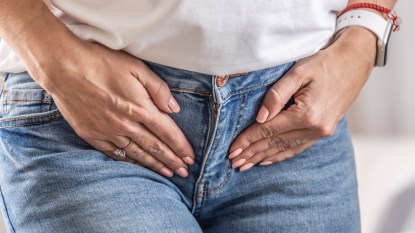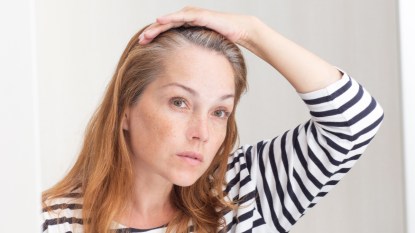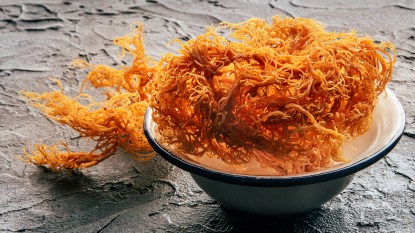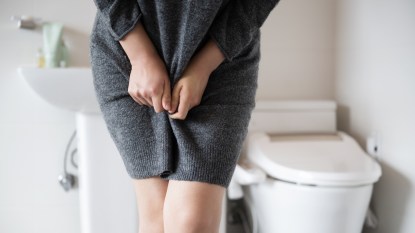Gynecologists Answer ‘What Causes Female Pubic Hair Loss?’ + All Your ‘Hair Down There’ Questions
Plus, the pubic hair dye designed specially for post-menopausal women
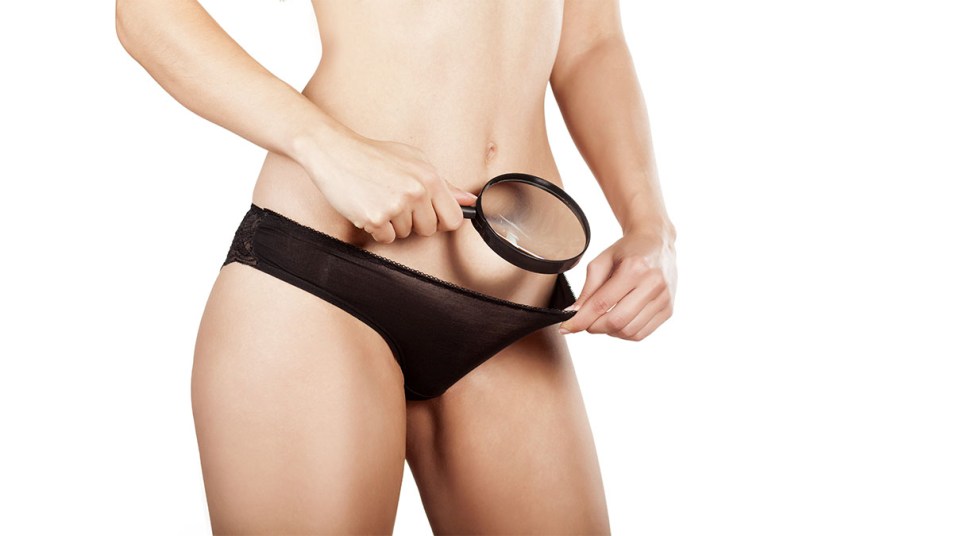
Wrinkles, age spots and sagging breasts… These are body changes we expect as we age. But there’s one change most of us don’t anticipate — or ever consider — until it happens: thinning pubic hair. Just like the hair on our head can become more sparse as we get older, so can pubic hair. Not only that, pubic hair can change texture and color. What causes female pubic hair loss, and do you need to do anything about it?
We asked a panel of gynecologists who specialize in menopausal health:
√ Barbara DePree, MD, is a Certified Menopause Practitioner and a gynecologist in private practice. She’s also the director of Women’s Midlife Services at Michigan’s Holland Hospital and founder of MiddlesexMD.com, an educational resource for women’s sexual health in perimenopause and beyond.
√ Felice Gersh, MD, is an ob/gyn and director of the Integrative Medical Group of Irvine, California. She spent 12 years as an Assistant Clinical Professor at the Keck USC School of Medicine and is double board-certified in both ob/gyn and integrative medicine. She’s also the author of several books, including Menopause: 50 Things You Need to Know.
√ Laura Corio, MD, is author of The Change Before the Change: Everything You Need to Know to Stay Healthy in the Decade Before Menopause.
Read on for the top questions and answers about pubic hair changes after menopause.
What causes female pubic hair loss?
More than half of women deal with noticeable pubic hair loss as they age, says Dr. DePree. “All of the hair on your body goes through a cycle where it grows for a certain amount of time, then falls out,” she explains. And changing hormone levels after menopause, including low estrogen and testosterone, can affect this cycle, shortening the growth phase and delaying regrowth. What’s more, hair follicles shrink as we age, says Dr. Depree. This can make any new growth more fine and harder to see.
Can I regrow thinning pubic hair?
While thinning pubic hair is generally not a cause for concern, there are ways to regrow it if you’re unhappy with the loss, says Dr. Corio. Here, the best options:
Supplement with a B-vitamin complex
B vitamins are known to benefit hair growth by strengthening strands and preventing breakage, she says. One to try: Nature Made Super B-Complex (buy for $7.53, Amazon)
Increase your intake of zinc
A study in the International Journal of Dermatology found that people with the most severe hair loss had 34% lower blood zinc levels than those with the least hair loss. And another study published in the journal Skin Appendage Disorders found that 60% of patients with patchy hair loss who took zinc for three months experienced complete hair regrowth. Dr. Corio advises increasing your zinc intake by incorporating zinc-rich foods such as oysters, lean beef or fortified breakfast cereal.
You can also raise zinc levels by supplementing with up to 15 mg a day (try Carlson Zinc 15 mg, buy for $14.88, Amazon), says Dr. Gersh, who often encourages her patients to take a multi-mineral supplement, which includes zinc and other key micronutrients. “When you’re deficient in various micronutrients — and zinc is certainly an important one — you can have manifestations like thinning or lost hair,” she says. “I do a fair amount of micronutrient testing because it’s an area that’s often overlooked.” A multi-mineral supplement to try: NOW Full Spectrum Mineral Caps (buy for $12.39, Amazon).
Ask your doctor to check your DHEA levels
Dr. Corio suggests asking your doctor to test your blood for a dehydroepiandrosterone, or DHEA deficiency. This hormone helps regulate testosterone production, and if your levels are low, supplementing with DHEA can significantly thicken pubic hair, according to an international collaborative study in The Journal of Clinical Endocrinology & Metabolism including researchers from the Mayo Clinic, Columbia University, Massachusetts General Hospital and the University of Colorado School of Medicine. Your doctor will help determine an appropriate dose.
Related: The Drugstore ‘Master Hormone’ That Works Better Than a Rx To End Tiredness
My pubic hair turned gray. Is it safe to dye it?
Again, just like the hair on our heads often grays with age, it’s not uncommon for pubic hair to do the same, says Dr. Corio, who adds that it’s a completely normal phenomenon. It happens because hair strands begin to lose melanin, the pigment that gives them color.
Dr. Corio says it’s generally safe to dye your pubic hair so long as you’re careful. In fact, there are products designed specifically for this purpose. Betty Color for the Hair Down There is a popular option that doesn’t contain parabens or ammonia that can irritate sensitive skin. The kit works like any other at-home hair color kit: You mix the solution, then use a mascara-like wand to apply. The dye comes in traditional colors like blond, auburn, black and brown—and even more exotic hues like hot pink, blue, green, orange and ruby red.
If you do decide you’d like to experiment with pubic hair dye, Dr. Corio says it’s especially important to do a patch test first, just like you would with at-home color on your scalp. The reason? The chemicals that change the color of hair can sometimes cause skin irritation or an allergic reaction. If the patch test doesn’t bother you, go ahead and apply the product according to the package directions. Just be careful not to get any dye on the highly sensitive labia or lips of your vulva, which you can protect by applying a layer of petroleum jelly before using the dye.
Do I even need pubic hair?
You may be asking yourself why we have pubic hair in the first place. Dr. DePree says it’s important to vaginal health because it traps dirt, sweat and bacteria that can lead to infection. Dr. Gersh adds that pubic hair likely plays a role in protecting a healthy microbiome, the good bacteria that contribute to vaginal health. “These bacteria are supposed to be naturally there, and they help to expel toxins and kill off any bad invaders, so the pubic hair could play a protective role for them.” For this reason, Dr. Gersh doesn’t recommend complete removal of pubic hair, but says trimming with scissors is fine.
To keep pubic hair healthy:
Use a gentle conditioner infused with amino acids
Doing so helps strengthen pubic hair and moisturizes and protect strands against breakage, says Dr. DePree. Just be sure to pick one without phthalates, like Nexxus Unbreakable Care Thickening Conditioner (buy for $15.99, Amazon)
Get enough protein in your diet
Adequate amounts of protein are key to optimal function of hair follicles, which are responsible for hair growth, says Dr. Depree. The American Academy of Dermatology recommends women over 50 get 46 grams daily (a chicken breast contains about 30 grams) to prevent hair loss and thicken hair.
Avoid irritating chemicals
Any products you use on the sensitive pubic area should be clean, organic and made from natural sources, says Dr. Gersh, who favors products made with aloe or organic shea butter.
Wear loose clothing
Dr. Gersh advises avoiding daily, all-day wear of tight fabrics like lycra or spandex. “Organic cotton, especially for underwear, is great. You want to try to get a fabric that’s comfortable and has breathability.”
This content is not a substitute for professional medical advice or diagnosis. Always consult your physician before pursuing any treatment plan.
For help with more down-there concerns, keep reading:
Balancing Your Vaginal pH Can Put an End to Odors, Itching and Discharge, Say MDs
Ob/Gyns on How to Tell If That Lump Is a Vaginal Skin Tag Or Something More Serious
Top Doc: Your Vagina *Does* Get Smaller After Menopause + The Lubricants That Women Over 50 Should Never Use


